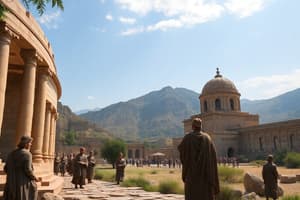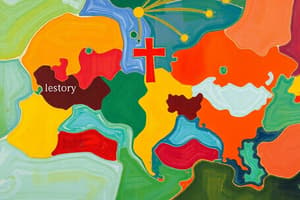Podcast
Questions and Answers
What is the primary focus of the study of history?
What is the primary focus of the study of history?
- Review of current news articles
- Study of past events in human affairs (correct)
- Analysis of fictional events
- Study of future possibilities
Which period immediately follows Prehistory in historical classification?
Which period immediately follows Prehistory in historical classification?
- Ancient History (correct)
- Early Modern History
- Medieval History
- Modern History
What significant theme in history includes movements for civil rights and social justice?
What significant theme in history includes movements for civil rights and social justice?
- Economic Systems
- Globalization
- Social Change (correct)
- Civilization and Culture
Which type of source consists of original documents like letters and diaries?
Which type of source consists of original documents like letters and diaries?
What is historiography concerned with?
What is historiography concerned with?
Who is known as the 'Father of History'?
Who is known as the 'Father of History'?
Which historical period includes the Renaissance and the Reformation?
Which historical period includes the Renaissance and the Reformation?
What method in history focuses on specific themes across different periods?
What method in history focuses on specific themes across different periods?
Flashcards are hidden until you start studying
Study Notes
Key Concepts in History
Definition of History
- Study of past events, particularly in human affairs.
- Involves the analysis of records, artifacts, and oral traditions.
Historical Periods
-
Prehistory
- Time before written records.
- Includes the Stone Age, Bronze Age, and Iron Age.
-
Ancient History
- Emergence of civilizations (e.g., Mesopotamia, Ancient Egypt, Greece, and Rome).
- Development of writing and record-keeping.
-
Medieval History
- Period from the fall of the Roman Empire to the Renaissance.
- Features feudalism, the spread of Christianity, and the rise of Islamic empires.
-
Early Modern History
- Encompasses the Renaissance, Reformation, and Age of Discovery.
- Includes the rise of nation-states and colonial empires.
-
Modern History
- Events from the late 18th century to the present.
- Includes key events like the Industrial Revolution, World Wars, and globalization.
Important Historical Themes
-
Civilization and Culture
- Development of arts, philosophy, religion, and science.
-
Conflict and Conquest
- Wars, revolutions, and colonization that shaped boundaries and power dynamics.
-
Social Change
- Movements for civil rights, feminism, and social justice.
-
Economic Systems
- Evolution from feudalism to capitalism and communism.
-
Globalization
- Increased interconnectedness among nations and cultures.
Historical Sources
-
Primary Sources
- Original documents (e.g., letters, diaries, official records).
-
Secondary Sources
- Analyses and interpretations of primary sources (e.g., textbooks, articles).
Historiography
- Study of how history is written and interpreted.
- Different schools of thought (e.g., Marxist, feminist, post-colonial).
Significant Historical Figures
- Herodotus: The "Father of History" for his work on ancient Greece.
- Thucydides: Historian of the Peloponnesian War.
- Karl Marx: Influenced historical analysis of class struggle.
- Howard Zinn: Advocated for a people's history perspective.
Methodologies in History
-
Chronological Approach
- Following the order of events over time.
-
Thematic Approach
- Focusing on specific themes or issues throughout different periods.
-
Comparative History
- Examining similarities and differences across various cultures and eras.
Conclusion
Understanding history provides insight into human behavior, societal development, and the complexities of contemporary issues.
Definition of History
- Study of past events, particularly in human affairs.
- Involves the analysis of records, artifacts, and oral traditions.
Historical Periods
- Prehistory: Time before written records
- Includes the Stone Age, Bronze Age, and Iron Age.
- Ancient History: Emergence of civilizations (e.g., Mesopotamia, Ancient Egypt, Greece, and Rome)
- Development of writing and record-keeping.
- Medieval History: Period from the fall of the Roman Empire to the Renaissance
- Features feudalism, the spread of Christianity, and the rise of Islamic empires.
- Early Modern History: Encompasses the Renaissance, Reformation, and Age of Discovery
- Includes the rise of nation-states and colonial empires.
- Modern History: Events from the late 18th century to the present
- Includes key events like the Industrial Revolution, World Wars, and globalization.
Important Historical Themes
- Civilization and Culture: Development of arts, philosophy, religion, and science.
- Conflict and Conquest: Wars, revolutions, and colonization that shaped boundaries and power dynamics.
- Social Change: Movements for civil rights, feminism, and social justice.
- Economic Systems: Evolution from feudalism to capitalism and communism.
- Globalization: Increased interconnectedness among nations and cultures.
Historical Sources
- Primary Sources: Original documents (e.g., letters, diaries, official records)
- Secondary Sources: Analyses and interpretations of primary sources (e.g., textbooks, articles)
Historiography
- Study of how history is written and interpreted.
- Different schools of thought (e.g., Marxist, feminist, post-colonial)
Significant Historical Figures
- Herodotus: The "Father of History" for his work on ancient Greece.
- Thucydides: Historian of the Peloponnesian War.
- Karl Marx: Influenced historical analysis of class struggle.
- Howard Zinn: Advocated for a people's history perspective.
Methodologies in History
- Chronological Approach: Following the order of events over time.
- Thematic Approach: Focusing on specific themes or issues throughout different periods.
- Comparative History: Examining similarities and differences across various cultures and eras.
Studying That Suits You
Use AI to generate personalized quizzes and flashcards to suit your learning preferences.



